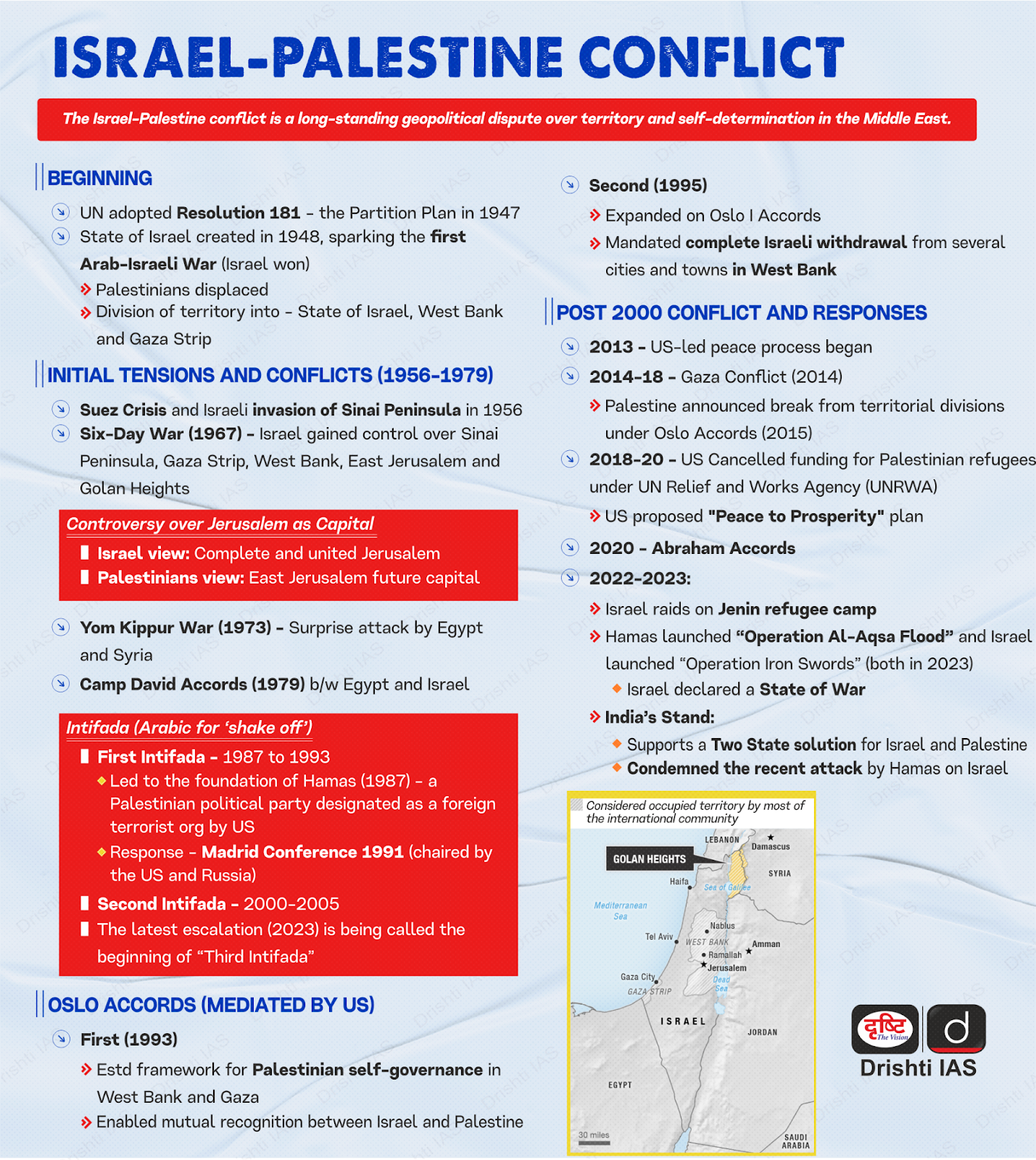International Relations
Israel-Hamas Conflict and its Global Impact
- 31 Oct 2023
- 6 min read
For Prelims: Israel-Hamas conflict, Gaza Strip, Strait of Hormuz
For Mains: Impact of Israel-Palestine Conflict on India and International geopolitical scenario, Global Trade War, Oil Prices Manipulation.
Why in News?
The ongoing Israel-Hamas conflict has escalated due to Israel's ground offensive in the Gaza Strip, to eliminate Hamas. This has raised concerns about the post-conflict phase and its potential impact on the global economy.
- Bloomberg, a global media company has outlined three scenarios for the conflict and how each could affect countries around the world.
What are the Three Possible Scenarios for the Conflict and their Potential Effects?
- Limited Conflict in Gaza:
- In this scenario, the conflict remains primarily localized in the Gaza Strip, with limited expansion into other regions.
- Potential Effects:
- Limited direct impact on the global economy. Nevertheless, this is unwelcome news for a world economy recovering from various setbacks, as central banks struggle between addressing inflation and preventing economic slowdowns.
- The conflict can result in an increasing humanitarian crisis in Gaza, marked by significant casualties, with the death toll already surpassing 8,000.
- Regional Conflict with Iran-backed Militants:
- This scenario involves a broader regional conflict, with the potential involvement of Iran-backed militant groups in Lebanon and Syria, as well as the Houthis in Yemen.
- Potential Effects:
- This could lead to escalation of violence in multiple regional locations, leading to increased instability and conflict..
- Oil prices could rise to around the mid-USD 90s, higher than the current USD 90 per barrel,
- Higher inflation rates globally, potentially denting global economic growth by 0.3% points.
- Full-scale War Involving Israel, Iran, and Major Powers:
- The most extreme scenario envisions a full-scale war between regional powers Israel and Iran, with the possible involvement of major world powers such as the United States, China, and Russia.
- Potential Effects:
- The conflict could disrupt trade and global crude oil supply in the Middle East, affecting countries in the region and their trading partners.
- Over 20% of the world's crude supply comes from West Asia, conflict in the region may drastically push up the Crude oil prices up to USD 150 per barrel.
- Even with potential capacity from Saudi Arabia and the UAE, if they do not align with Iran, oil shipments may still face challenges in passing through the Strait of Hormuz, a 48-kilometer shipping chokepoint through which nearly one-fifth of the world's total oil production transits.
- Global inflation could rise to about 6.7% in 2024, potentially causing global economic growth to slow by almost 2% points and leading to a possible worldwide recession with significant implications for countries like India and the US.
- The conflict could disrupt trade and global crude oil supply in the Middle East, affecting countries in the region and their trading partners.
Hamas
- About:
- Hamas is a Palestinian political armed group that was founded in 1987. It's a militant group that emerged as a resistance movement against Israeli occupation.
- History:
- Hamas was created in 1987 as an offshoot of Egypt's Muslim Brotherhood seeking to fulfill its agenda through violent jihad.
- It gained popularity as a resistance movement against Israeli occupation and Fatah.
- The United States has designated Hamas a terror organization since 1997. Many other countries, including Israel and most of Europe, see it the same way.
- Hamas was created in 1987 as an offshoot of Egypt's Muslim Brotherhood seeking to fulfill its agenda through violent jihad.
- Ideology:
- Hamas believes that no part of the land of Palestine shall be compromised or conceded.
- Hamas rejects any alternative to the complete liberation of Palestine.
UPSC Civil Services Examination, Previous Year Question (PYQ)
Prelims
Q1. Mediterranean Sea is a border of which of the following countries? (2017)
- Jordan
- Iraq
- Lebanon
- Syria
Select the correct answer using the code given below:
(a) 1, 2 and 3 only
(b) 2 and 3 only
(c) 3 and 4 only
(d) 1, 3 and 4 only
Ans: (c)
Q2. Which one of the following countries of South-West Asia does not open out to the Mediterranean Sea? (2015)
(a) Syria
(b) Jordan
(c) Lebanon
(d) Israel
Ans: (b)
Q3. The term “two-state solution” is sometimes mentioned in the news in the context of the affairs of (2018)
(a) China
(b) Israel
(c) Iraq
(d) Yemen
Ans: (b)
Mains
Q. “India’s relations with Israel have, of late, acquired a depth and diversity, which cannot be rolled back.” Discuss. (2018)







